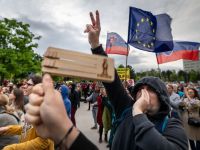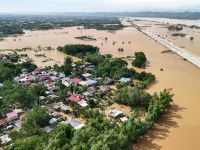The U.S. waged war on global terrorism has influenced many parts of the world, including the Horn of Africa. This American war has helped to promote peace-making efforts in Sudan (On Jan. 19, the Sudan government and rebels fighting in southern Sudan signed a ceasefire agreement covering a guerrilla stronghold in the central part of the country). However, according to foreign diplomats, at the same time, this U.S. anti-terror drive is complicating the instability prevalent in Somalia.
U.S. officials have cited Sudan and Somalia as potential shelters for terrorists, but beyond the war on terror, Washington's renewed interest could also influence whether these states shift towards peace or plunge even deeper into conflict.
According to The East African Standard, diplomats at a recent regional summit in the Sudanese capital Khartoum acknowledged that the United States had focused more attention on Sudan and Somalia since the September 11 terror attacks. For its part, the Sudanese administration admits Washington has adopted a more measured approach to the region since the attacks on the U.S., a shift in policy that could possibly help continuous efforts to end the country's 18-year bloody civil war and stop the human tragedy in the central part of Africa’s largest country.
However, Somalia's government accuses the Western superpower of a propaganda campaign to portray the country as a potential safe haven for Osama bin Laden's Al Qaeda followers, undermining its attempts to end a decade of intense conflict.
"People are asking themselves why, instead of helping Somalia, America or the West are engaged in such propaganda, which is detrimental to peace and stability," President of Somalia's transitional government, Abdiqassim Salad Hassan, told Reuters.
Sudan
U.S. President George W. Bush has launched renewed efforts to address Sudan's conflict before September 11. The American campaign on terror has boosted these efforts further. Sudan that sheltered Saudi-born Osama bin Laden from 1991 to 1996, has been intensifying since September 11 its security cooperation with the United States, in order to prove its anti-terror intents.
The civil war in Sudan, in general, is comprised of the Islamist government in the north against rebels fighting for more autonomy for the mainly Christian and animist (the belief in the existence of soul in every object) south.
American diplomats said in December 2001 that they had helped the government and rebels agree to extend a truce in the central Nuba region, though rebels say Khartoum has violated the deal.
Despite the renewed interest, Sudan says Washington needs to do much more to succeed after countless failed mediation attempts. It seems as though a quick solution for the country’s continuous war, which has claimed the lives of over 2 million people – is still remote.
"Despite the fact that the United States has taken much more constructive steps, there is a lot more that needs to be done for their position to succeed," said presidential peace adviser Ghazi Salah al-Din Atabani.
Somalia
The administration in Somalia is concerned that far from helping peace efforts, the United States could bring about even further chaos within the country.
Somalia has been without central government since 1991 and the transitional national government (TNG), set up last year, controls only parts of the capital and some other areas.
Warlords control the rest of the country and there is concern that the lack of central control could provide a perfect infrastructure for terrorist cells to thrive on.
Washington says it has stepped up surveillance in Somalia, urging opposition warlords to level accusations of terrorist activity around Mogadishu in the hope of winning U.S. support.
The TNG denies giving safe haven to terrorists, but fears the accusations are encouraging a more aggressive stance from Ethiopia, whom it accuses of backing its opponents.
"The TNG is in a much more defensive position," a Western diplomat said. "The Ethiopians . . . have jumped on the new climate to label the TNG as a Trojan Horse for international terrorism."
However, diplomats say that U.S. suspicions might force the TNG to take a softer approach to opposition factions, but warn that, here too, peace-making will be a long process. In December 2001, the TNG signed a deal with some opposition warlords calling for an "all-inclusive" government, but several key warlords rejected the deal. (Albawaba.com)
© 2002 Al Bawaba (www.albawaba.com)







